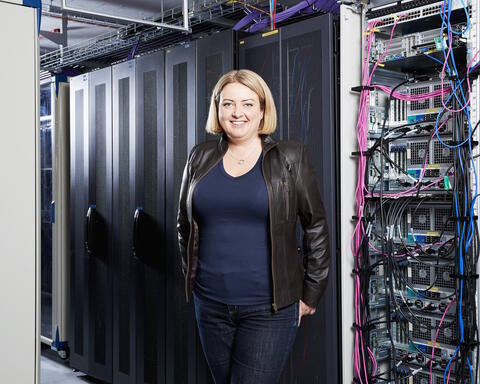Written by
Published
Category
Key topics
White-collar jobs are set to be transformed by AI – and business schools must adapt teaching practices quickly, so they can prepare students for the new world of work.
A consensus is emerging that artificial intelligence (AI) will be the key technological disruptor of our millennium, delivering new economic activity of up to $12 trillion and accounting for as much as 10 per cent of total global growth in GDP. Critically, some of this growth will arise from AI displacing or replacing human beings in the workforce.
Unlike prior technological revolutions that primarily impacted manufacturing and relatively low-skilled jobs, AI has the capacity to impact white-collar jobs. Business schools train people for such roles, so it is crucial we consider how AI will require us to reshape the traditional curriculum and learning experience to ensure students are well placed to thrive in this emerging AI-enabled world.
The curriculum must change
While AI will undoubtedly impact white-collar jobs, it’s important that we avoid framing this impact as a choice between humans and AI. Research finds that combined human-AI intelligence can outperform human-only and AI-only workers in games such as chess and tasks such as market forecasting, for example. This emerging view of hybrid intelligence represents a more optimistic and collaborative vision of our future with AI.
So what do schools need to do now to help students engage with this emerging world of hybrid intelligence? For a start, we need to move the focus of our curricula towards the skills and abilities AI is less able to replicate. At present this means leaning into critical and creative thinking, as well as soft skills, coaching students in empathy and team building.
On top of this, we should be teaching students the practical skills they need to engage with AI. This includes training in prompt engineering and familiarising professionals in working in partnership with digital assistants. These relatively minor initial steps will set students on a path to meaningful engagement with AI and enable them to start forming a view on how their future careers will fit within the hybrid intelligence model.
How do we deliver education?
AI will also have a direct impact on how schools develop and deliver education. UNESCO has categorised the myriad ways in which large language models (LLMs) such as ChatGPT can support staff and students in performing the tasks that comprise contemporary education models. These include the LLM acting as a study buddy to help students gauge their understanding of a topic, or acting as a Socratic opponent to help develop their arguments.
The UNESCO report also highlights how LLMs can extend to tasks performed by the teacher. To conceptualise this, imagine that all teachers are provided with a personal AI teaching assistant. This might enable them to teach tens of thousands of students rather than hundreds, or to focus a greater proportion of their time on research and other activities.
We need to move the focus of our curricula towards the skills and abilities AI is less able to replicate
More controversially, tasks relating to the management of teaching staff can also now be performed by AI. Such algorithmic management is commonly used by Amazon, Uber, and across the broader tech sector. These systems are likely to gain traction across professional sectors including healthcare, law, management consulting and education. Taking this further, the administration of education may become largely automated, such that only a small number of human staff are needed – a "human-in-the-loop" digital education system.
Instinctively, we might believe that technology cannot possibly replace human staff, perhaps assuming that students will object to any reduction in human-to-human contact. However, we need to be careful not to fall into the trap of over-valuing human involvement. As Richard Susskind puts it: “Patients don’t really want neurosurgeons; what they want is health.” The same is true for students, who ultimately want and deserve the best possible education using all available tools.
Universities of the future
So, does all this mean that AI will replace the educator? Are we moving towards the lights-out university, akin to the fully automated factories being developed in Japan and China? It is possible and even likely in certain scenarios, but a much more likely near-term scenario for most business schools is that hybrid human-AI work will become the norm. Human staff will be supported by AI across the core tasks involved in curriculum delivery, student guidance, pastoral support and assessment.
At Imperial, we are actively working towards this future across our educational provision. To illustrate, our innovative cross-campus module "AI Ventures" brings together faculty and students from business and engineering to create new AI startups while leveraging AI tools across the student experience to accelerate that process.
The administration of education may become largely automated
We have also integrated a new AI system, Tutello, into our learning platform to enable AI and human tutoring and support. In this model, students are guided through their studies by AI, but are able to switch to human support when they wish. It will be instructive to observe when and why they choose to do this. We have also launched our Precision Education initiative, an analytics programme that links 17 different student data sources to create a foundational data layer for a broad range of AI initiatives.
Together, these initiatives reveal a clearer picture as to how AI will change the role of the educator and the broader education system. For traditional education, these tools are likely to accelerate the pivot away from conventional "sage on a stage" pedagogy and towards a more personalised, social and tutored model of education. More radically, AI will enable the development of new, largely automated educational systems capable of delivering high-quality education with little input from human teachers. In both cases, one thing is certain – AI is here to stay and schools will need to adapt.
This article draws on "Will AI Replace the Educator?", a Harvard Business Publishing event featuring Imperial Business School Professors of Practice David Lefevre and David Shrier.




